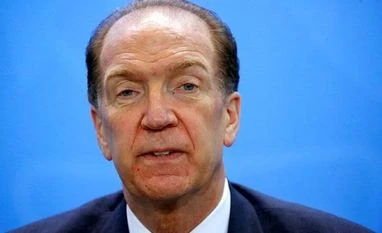World faces human catastrophe due to Russia-Ukraine war: David Malpass
World Bank President David Malpass said said that if the war continues, there will be record increases in food prices which would push hundreds of millions people into poverty and lower nutrition
)
World Bank Group President David Malpass
World Bank President David Malpass said that the global community is facing a "human catastrophe" in the wake of Russia's continued war against Ukraine.
Speaking to the BBC on Wednesday, Malpass said that if the war continues, there will be record increases in food prices which would push hundreds of millions people into poverty and lower nutrition.
"It's a human catastrophe, meaning nutrition goes down. But then it also becomes a political challenge for governments who can't do anything about it, they didn't cause it and they see the prices going up.
"The World Bank calculates there could be a huge 37 per cent increase in food prices, which is magnified for (the) poor, who will eat less and have less money for anything else such as schooling. And so that means that it's really an unfair kind of crisis. It hits the poorest the hardest. That was true also of Covid," he added.
Regarding the "broad and deep" price hikes, the World Bank chief told the BBC that it was "affecting food of all different kinds oils, grains, and then it gets into other crops, corn crops, because they go up when wheat goes up".
Also Read
Although there was enough food in the world to feed everybody and global stockpiles are large by historical standards, he warned that there will have to be a sharing or sales process to get the food to where it is needed.
Malpass further warned of a possible "crisis within a crisis" arising from the inability of developing countries to service their large pandemic debts, amid rising food and energy prices.
"This is a very real prospect. It's happening for some countries, we don't know how far it'll go. As many as 60 per cent of the poorest countries right now are either in debt distress or at high risk of being in debt distress.
"We have to be worried about a debt crisis, the best thing to do is to start early to act early on finding ways to reduce the debt burden for countries that are on have unsustainable debt, the longer you put it off, the worse it is," he told the BBC.
The World Bank chief's statement came after the UN had said earlier this month that the ongoing war has led to a "giant leap" in food prices, as they hit a new record high in March, the BBC reported.
The crisis has cut off supplies from the world's biggest exporter of sunflower oil and the cost of alternatives climbed.
Ukraine is also a major producer of cereals such as maize and wheat which have risen sharply in price too.
According to the UN Food Prices Index, the current rates are at their highest since records began 60 years ago, after they jumped nearly 13 per cent in March, following February's record high.
--IANS
ksk/
(Only the headline and picture of this report may have been reworked by the Business Standard staff; the rest of the content is auto-generated from a syndicated feed.)
More From This Section
Don't miss the most important news and views of the day. Get them on our Telegram channel
First Published: Apr 21 2022 | 10:38 AM IST


